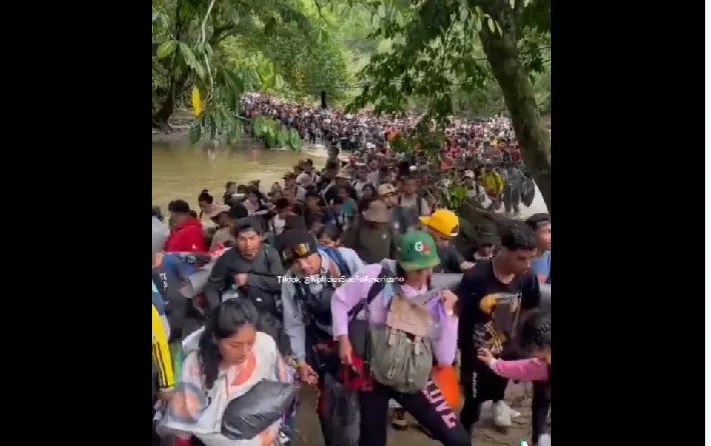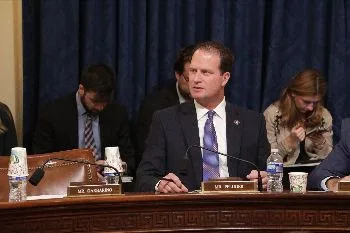| Committee on Homeland Security Hears Jaw-Dropping Testimony on Catastrophic Financial Burden of the Biden-Mayorkas Border Crisis |
THIS IS WHAT IS HEADED OUR WAY-WATCH

WATCH MORE:
| WASHINGTON, D.C. — This week, the House Committee on Homeland Security, led by Chairman Mark E. Green, MD (R-TN), held a hearing to examine the various financial costs of the historic national security and humanitarian crisis at the Southwest border. This hearing launched the fourth phase of the Committee’s oversight investigation into Department of Homeland Security (DHS) Secretary Alejandro Mayorkas’ handling of the border crisis and the policies that sparked it. Jonathan Lines, county supervisor for Yuma County, Arizona; Joseph Borelli, minority leader of the New York City Council; and Aaron Reichlin-Melnick, policy director at the American Immigration Council, provided witness testimony. Watch the full hearing here. The testimony of Mr. Lines and Mr. Borelli, whose communities have been deeply impacted by the unprecedented flood of illegal aliens across the Southwest border under Secretary Mayorkas’ policies, confirmed that those open-border policies have burdened the American people with an overwhelming cost. As this crisis continues, border communities are dealing with emergency resources being stretched thin, from hospitals to 911 call centers, as they provide care to illegal aliens in addition to the citizens of their communities. Communities have had to deal with an influx of new school-aged children, many of whom require special attention due to limited proficiency in English or other needs. Federal, state, and local law enforcement officers have had to spend increasingly scarce resources on dealing with the consequences of illegal immigration in their communities. America’s farmers and ranchers have also been forced to bear the cost of incalculable damage caused by illegal aliens trespassing on their property. Border wall materials that were bought and paid for by Congress have been left lying in the desert by this administration, another massive waste of tax dollars. |
| In his opening line of questioning, Chairman Green received confirmation that New York City residents are footing the bill for housing illegal aliens in hotel rooms: “It’s $400, $500 a night for a hotel room in New York City. I stayed in Dallas the other day, it was like $200 for just a regular room in Dallas. It’s $150 at an ICE detention bed. Why don’t we put people in an ICE detention bed?” Mr. Borelli responded: “One hotel in New York, the Roosevelt hotel—the cost that the city is leasing it for is $200 per night … there are 1,000 rooms so that’s $20 million per month roughly to pay for that one site and there are 206 sites being used.” In his closing statement, Chairmen Green refuted claims that illegal immigration represents a financial benefit: “The minority party has said that there are some kinds of financial upside to the way that Secretary Mayorkas’ policies are working right now with immigration. If that’s the case, then why is New York City Mayor Eric Adams saying that it’s going to destroy his city?” |
| Subcommittee on Cybersecurity and Infrastructure Protection Chairman Andrew Garbarino (R-NY) questioned witnesses on the burden to public resources caused by the influx: “New York City is currently experiencing serious problems with poverty and homelessness with low-income Americans who are just trying to get by. Has the New York City government diverted any public resources or spending away from low-income Americans to accommodate the illegal aliens arriving into the city?” Mr. Borelli concluded: “It’s not necessarily a reduction in spending, but it is a reduction in space. We have a homeless shelter, for example, that was approved for the north shore of Staten Island, which was intended on serving a specific population of presumably U.S. citizens who are experiencing homelessness. That shelter is now under consideration for the migrant crisis, and we’ve seen that happen in numerous locations. … We’ve never leased hotels en masse to address homelessness in New York. So, it’s not necessarily a reduction of services, it’s more finding the space and capacity to keep both populations in shelters. We had about sixty thousand people in our homeless shelters prior to the migrant crisis. Now, when you add the migrants and the New York City homeless, it’s somewhere around [more than] one hundred thousand.” |
| Subcommittee on Counterterrorism, Law Enforcement, and Intelligence Chairman August Pfluger (R-TX) highlighted the costs borne by Texas and Arizona as the humanitarian crisis remains at unprecedented levels under Mayorkas’ policies: “What you’re seeing in Arizona, what we’re seeing in New York City. Mr. Borelli, you said about 65,000 illegal immigrants in New York City right now? … That is 0.1% of the total amount of illegal immigrants that come into this country under President Joe Biden’s watch. And the mayor of New York is standing up and saying, ‘We can’t handle this. We can’t do this.’ I agree with the mayor on that point. He can’t handle it.” In response to Rep. Pfluger’s question about the shocking truth of cartel human and drug smuggling in his area, Mr. Lines responded: “Yuma and the border communities have a disproportionately high number of overdoses or poisonings. … Our rate of fentanyl poisonings on the borders is 19 times higher.” Rep. Pfluger concluded: “And 90% of the precursors are coming from China into Mexico, crossing the border, and yet we have people testifying today that are saying that it’s unrelated to the crisis that we face. This crisis has cost Texas $5 billion dollars last year, $5 billion dollars this year, $9 to $10 billion dollars next year. I have the sheriff of Ector Count—Odessa, Texas—texting me right now saying that in July, 1,041 prisoner days, due to illegal immigration, were taken up in the Ector County sheriff’s prison. That was just in July. You average that across the entire year that’s almost a million dollars just on illegal immigration. … H.R. 2 is the solution that we need.” |
| Subcommittee on Emergency Management and Technology Chairman Anthony D’Esposito (R-NY) questioned Mr. Borelli not just on the price New York must pay to fund shelters for illegal aliens, but how they must pay to lease federal property to deal with the crisis caused by the federal government: “You mentioned during your opening remarks that in 2023, New York City will bring up a bill of $4.7 billion to fund the migrants coming into New York City. It’s estimated that in 2024, we’re going to see a minimum of $6 billion dollars spent on the migrants coming into New York City. Some of my colleagues mentioned that number is bigger than their entire state’s budget. …[Floyd Bennett Field in Brooklyn] has been chosen to shelter thousands of migrants. Do you know how much this city will be paying to lease Floyd Bennett Field from the federal government?” Mr. Borelli answered: “Yes, it’s $21 million for the year in addition to costs in terms of bringing infrastructure and other necessary items to the site.” |
| Rep. Mike Ezell (R-MS) discussed the cost of wasted border wall materials under this administration and the burden on local law enforcement due to the historic Southwest border crisis: “The drain on our financial resources is staggering. $151 billion is the estimated cost of illegal immigration to this country each year. … We can’t afford to keep spending this much money when we know there is a solution. A recent DHS report estimated the cost of a physical border wall to be $20 billion dollars. This is one eighth of the yearly cost of illegal immigration in this country. Mr. Lines, do you think building a physical wall at our Southern border is a fiscally responsible decision?” Mr. Lines answered: “That’s one of the tools that we should utilize, and when Secretary Mayorkas was in Yuma, he made a commitment to Mayor Nicholls and myself that he would fill nine of the eleven gaps that we had in Yuma and, so far, we have three that have been completed. But that was done with new material, not the material that had been previously purchased and laying within fifty yards of the new installation material.” Rep. Ezell continued: “As a former sheriff I know the challenges of stretching every dollar we had in our budget to ensure the safety of citizens in my community. With the massive influx of illegal immigrants since Joe Biden took office, the financial stress is falling on state and local law enforcement. … For example, in your home state of Arizona, $20 million has been allocated to a border task force. When states are having to spend millions of dollars to combat illegal immigration, what strain does this put on state local budgets to ensure safety?” Mr. Lines answered: “Arizona has been disproportionately affected as far as our state, local, and federal augmentation of implementing border security. That state task force has done well to work along the corridors of the interstate, where they work with federal and local partners, our sheriff and other sheriffs, where they [have] been able to interdict the fentanyl and those people who tend to bypass the safer areas and go straight across the desert, which is extremely dangerous. We also constructed a border wall out of Conex boxes and that provided additional assurances directly around the city of Yuma, where we had people walking through fields and walking directly into homes or to other areas seeking assistance.” |
| Rep. Eli Crane (R-AZ) questioned witnesses on the thinning emergency resources in border communities like Yuma, Arizona due to the border crisis: “Mr. Lines, I know there has been some issues down in Arizona, and specifically Yuma, with the hospital down there and just how this situation has really burdened the health system down there. Can you go into that?” Mr. Lines answered: “We have seen surges that have resulted in large numbers of people being taken directly to Yuma Regional Medical Center. We have seen women approaching the border in labor. … to the point where our emergency room and our maternity ward was overrun. We have one local hospital that is a community hospital, it’s a land grant hospital with a board, and they have disproportionately borne a cost of more than $26 million dollars that has not been reimbursed.” |
Related Posts:
Minneapolis Learns the Cost of Sanctuary...
Minnesota Is Quietly Cooperating With ICE While the Streets Tell a Different Story
Minneapolis h...
WITH TEETH! How the National Security St...
The Remaining Chapters Explain How the Strategy Is Enforced in the Real World
This article is th...
What the Epstein Files Reopen and Why Jo...
The latest releases of Epstein-related records, in late Jan. 2026, do not establish criminal wrongd...
